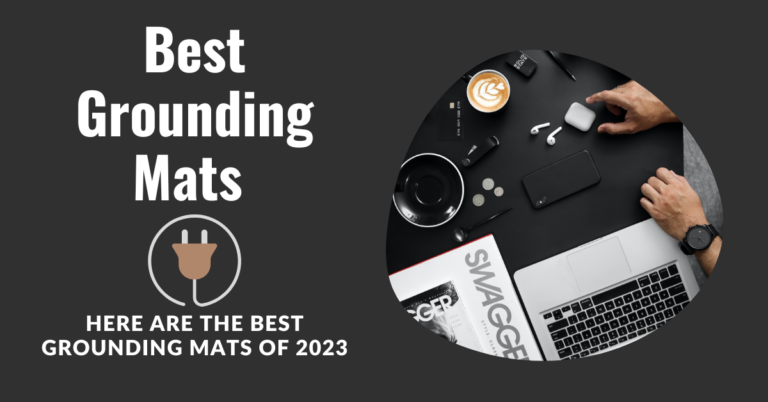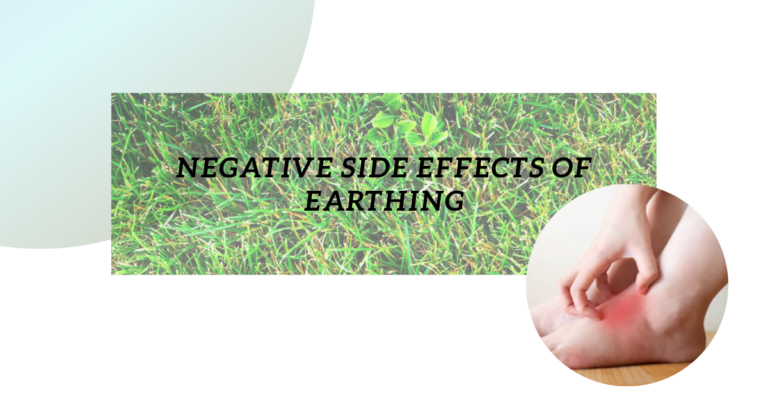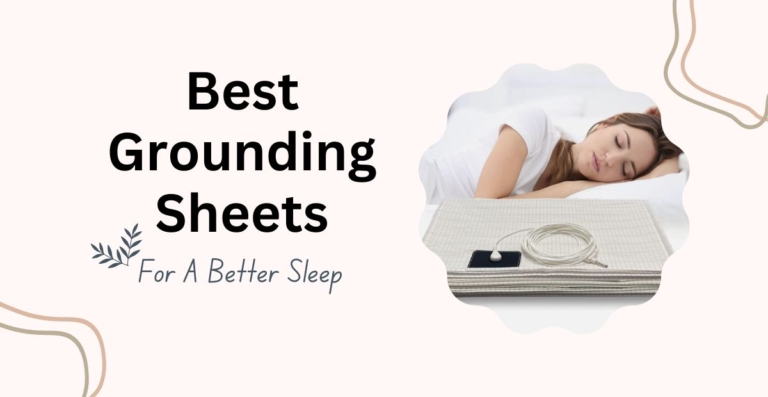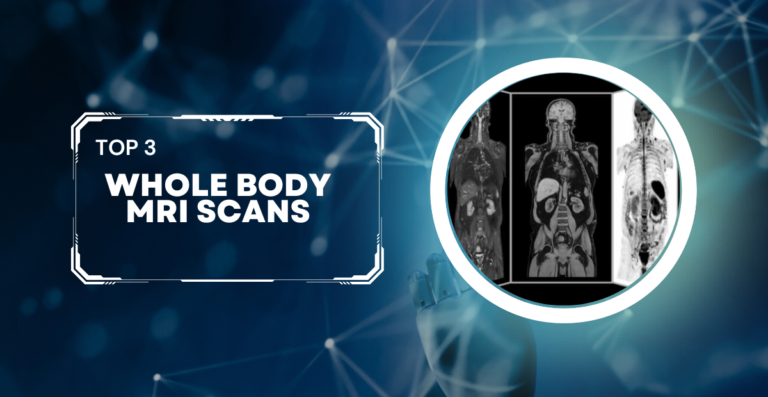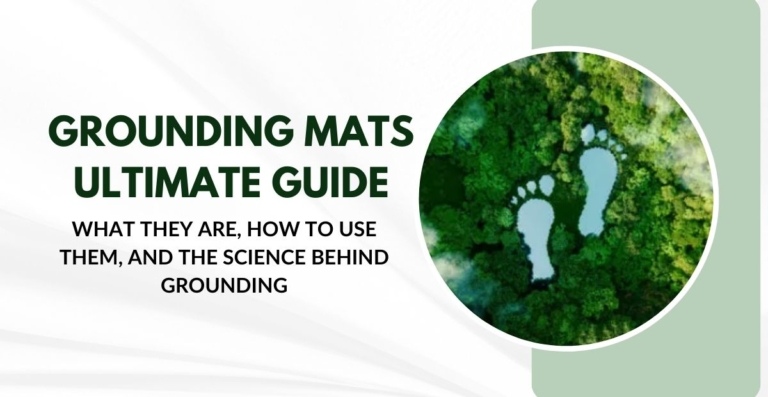43 Unusual Tips For a Better Sleep
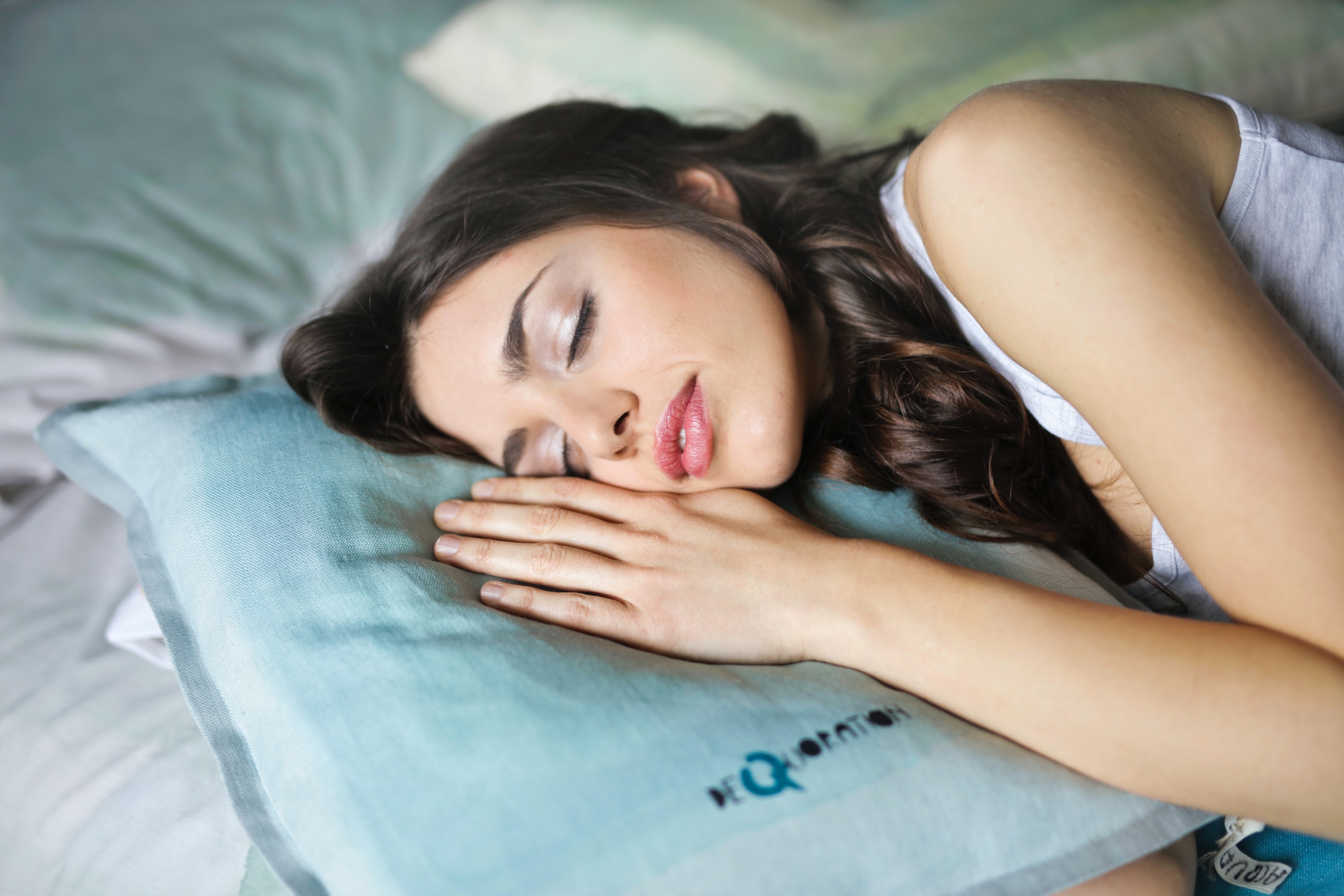
What Are the Best Ways to Improve Your Sleep?
According to the National Institute of Health, we spend about one third of our lives asleep.
Sleep is so complex that there seems to be an infinite number of things that affect both the quality and duration of your nightly shut-eye.
I myself have spent many sleepless and frustrating nights tossing and turning, wondering why I could not simply fall asleep and stay asleep.
With months and months of trial and error, I have finally come to understand what works for me.
I have worked hard to compile a list (with more to come) of 43 ways that I have personally used to improve my sleep!
Each point has been backed by scientific literature or by an expert, with the reference list posted at the end of this blog.
Whether you are looking to improve your athletic ability, get better grades, or simply enjoy less fatigue and brain fog during the day, read on to grab some tips and tricks that you may not have heard of!
1. Get A Grounding Mat
Grounding, also known as Earthing, is the practice of having skin-contact with the Earth or with a grounding device, such as a grounding mat. It can help balance out the positive and negative charge in your body, leading to a much more restful sleep!1
2. Take a Magnesium Supplement
Magnesium has been shown to improve sleep in elderly people.The participants too 500mg daily for 8 weeks and saw a significant improvement in insomnia2
3. Reduce Artificial Light Exposure
Light that enters your eyes at night causes reduced melatonin production in the brain, leading to a later onset of sleep. So switch off your lights and reduce screen time. Blue light blocking glasses are also handy!3
4. Take a Zinc Supplement
Taking Zinc at night has been shown to increase the quality and the amount of sleep in humans. In this study, participants who consumed 15mg a day saw drastic sleep improvement.4
5. Wake Up at the Same Time Everyday
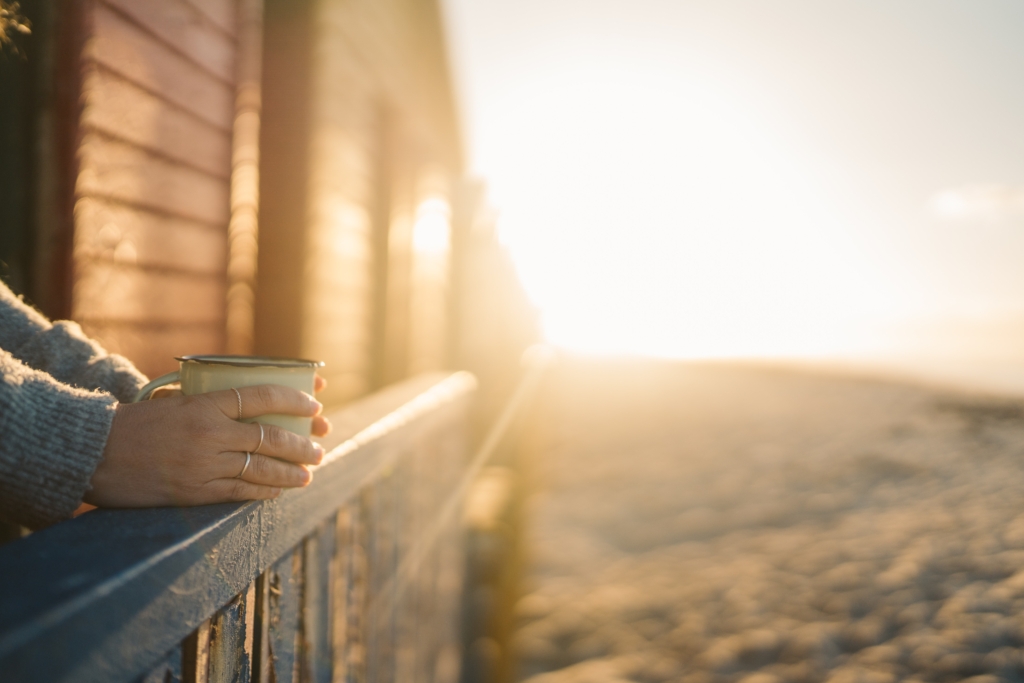
According to sleep specialist Dr. Michael Breus, fixing your wake time and sticking to it can reinforce your circadian rhythm, making it easier to fall asleep at night.5
6. Get Exposure to Natural Light as Early as Possible After Waking
Natural outdoor light is required to tell the brain it’s time to wake up. This will set your circadian clock to the right time and make it easier to fall asleep at night.6
7. Keep Your Room Cool
Internal body temperature drops at night and is a signal that it is time to sleep. Keeping a cooler temperature in your room helps this happen.7
8. Get Some Movement in During the Day
Getting some movement during the day has been shown to increase sleep quality and improve one’s ability to fall asleep faster. Exercise has a profound impact on mood as well and endorphin level. The temporary increase in body temperature during activity can also help later facilitate the fall in body temperature when it is time to sleep.8
9. Read Before Bed
Reading can help relax the mind by quieting mental chatter. It can also help reduce heart rate and relax muscles.9
10. Use a Red Light Lamp

A study showed that sleep quality and serum melatonin levels improved when participants were exposed to red light for 30 minutes before bed.10
11. Wear and Eye Mask at Night
An experiment showed that wearing an eye mask at night increased the quality of sleep, which led to improved cognitive performance.11
12. Drink More Water
A study showed that inadequate hydration led to evidence of reduced time asleep in adults. Thus, ensuring you are well-hydrated throughout will likely result in a longer sleep duration.13
13. Avoid Heavy Mixed Meals Before Bed
Large meals can cause uncomfortable digestive sensations that can keep you awake. Research has shown that eating smaller (150 calorie or less) nutrient dense meals and sticking to one macronutrient doesn’t disrupt sleep and could possibly show a benefit.14
14. Move Your Evening Workout to Earlier in the Day
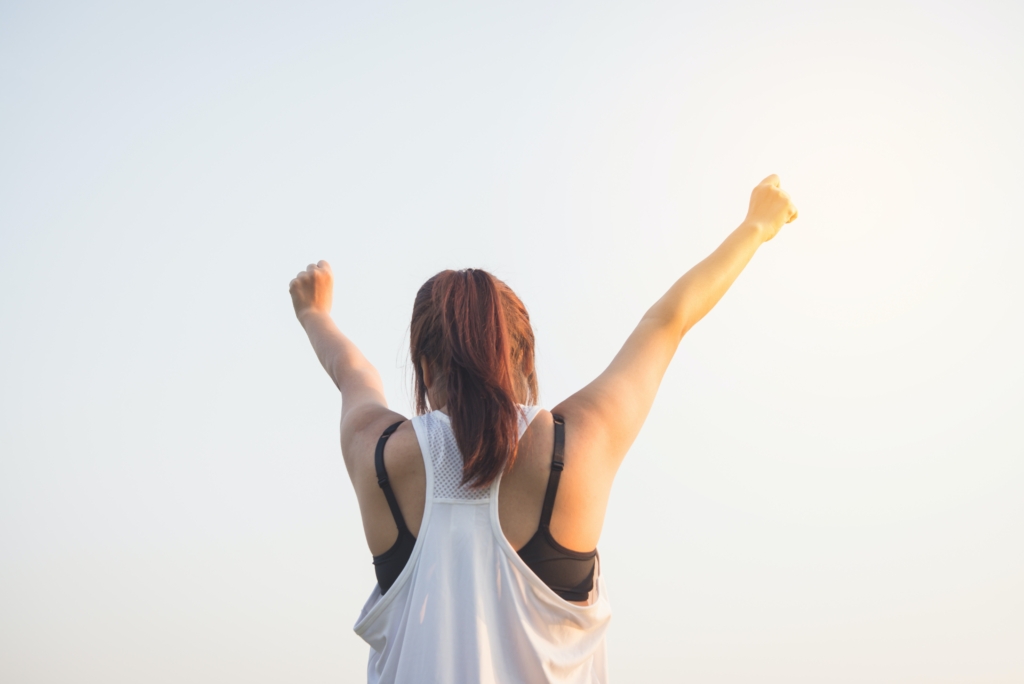
Working out too close to your sleep time has been shown to disrupt sleep. This is likely due to the rush of endorphins and rise in body temperature that take at least a couple of hours to come back down.8
15. Reduce Alcohol Consumption
Consuming alcohol has been shown to reduce sleep quality, reduce sleep duration, and increase sleep disturbances. The higher the amount of alcohol, the more pronounced these effects were.15
16. Take Melatonin at a Lower Dose
Researchers found that a physiological dose of 0.3mcg (as opposed to the 2-10mg doses found in many supplements) has a greater effect on improving sleep quality.
Additionally, this lower dose reduces the potential of experiencing drowsiness the next day, as is often seen when taking melatonin at a higher dose.16
17. Try Valerian Root Before Bed
Research has shown that valerian root can aid in improving sleep quality and help you fall asleep. 500mg dose is recommended.17
18. Swap Out Your Afternoon Coffee for Tea

Teas contain a unique compound called L-Theanine. This compound has been shown to improve sleep quality and duration.18
19. Take a Warm Bath
As discussed in point 7, facilitating the body’s ability to reduce core temperature helps it prepare for sleep. Taking a hot bath or shower brings the blood to the surface of the skin and opens pores to allow for that cooling to take place more readily. It also helps to relax muscles and ease tension.19
20. Get a White Noise Machine
Studies show that white noise may improve sleep in a high noise environment, such as a busy city or a hospital.20
21. Sleep With a Weighted Blanket
Swapping your regular blanket for a weighted one has been shown to decrease anxiety and may help reduce the severity of insomnia.21
22. Try a Glycine Supplement
Glycine has been shown to improve the quality of sleep in people who struggle with insomnia.22
23. Regularly Wash Your Sheets
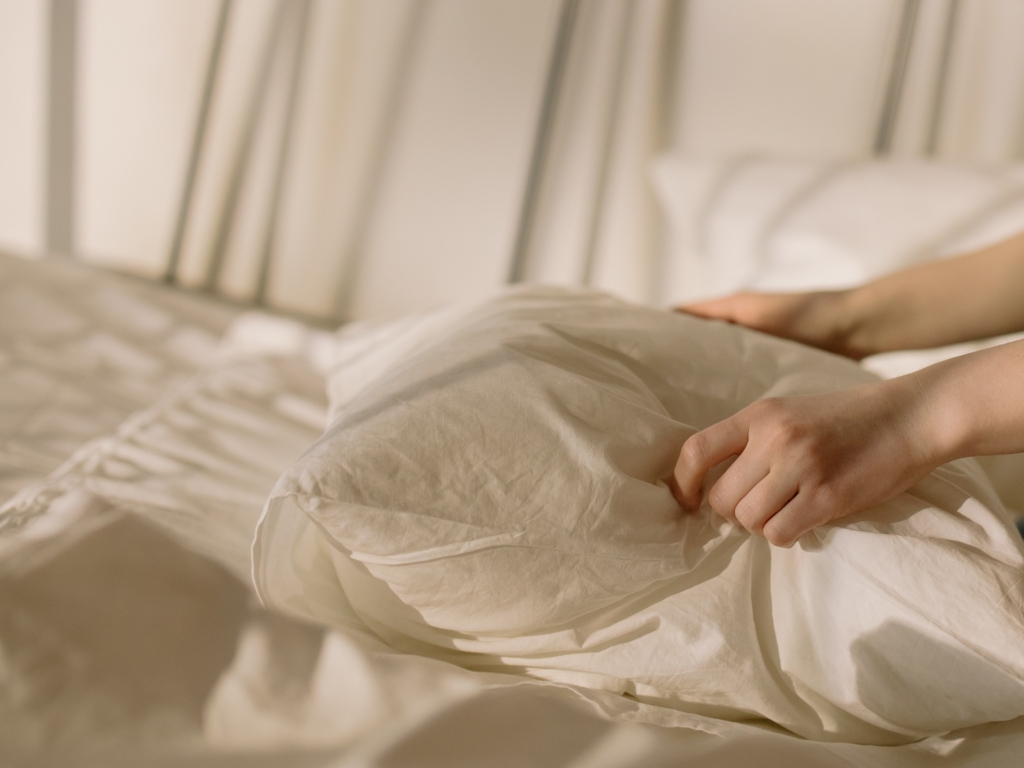
Unclean sheets can lead to a buildup of skin which in turn leads to increased dust mites. If you suffer from allergies, eczema, or asthma, washing your sheets once a week can drastically improve your sleep experience.23
24. Use Your Bedroom for These 3 Activities Only
Reducing the different activities you do in bed is likely to reduce your brain’s association with those wakeful activities.
Thus, you should use your bed for only sleeping, sickness, or sex. Psychologically, your brain will start to associate your bed and bedroom with sleep and rest, thus improving your sleep experience.24
25. Limit Nap Times to 20 Minutes or Less
Longer naps are likely to interfere with night time sleep.
If you struggle from insomnia and are a regular napper, try to implement a taper-off schedule, reducing nap duration and frequency overtime until your night time sleep is restored.25
26. Breathe Through Your Nose
Nasal breathing, especially at night, has been shown to increase overall sleep quality and reduce the number of wake-ups during the night.
Although it may sound alarming, taping your mouth shut at night has been shown to improve sleep apnea.
If you find you breathe through your mouth often during the day, practice nasal breathing and tape your mouth at night to avoid unconscious mouth breathing.26
27. Add Lavender to Your Sleep Routine
A study showed an improvement in sleep quality in college students who added inhaled lavender to their sleep hygiene regiments. Grab some lavender essential oil and give it a try!27
29. Sleep With Your Phone Out of Reach
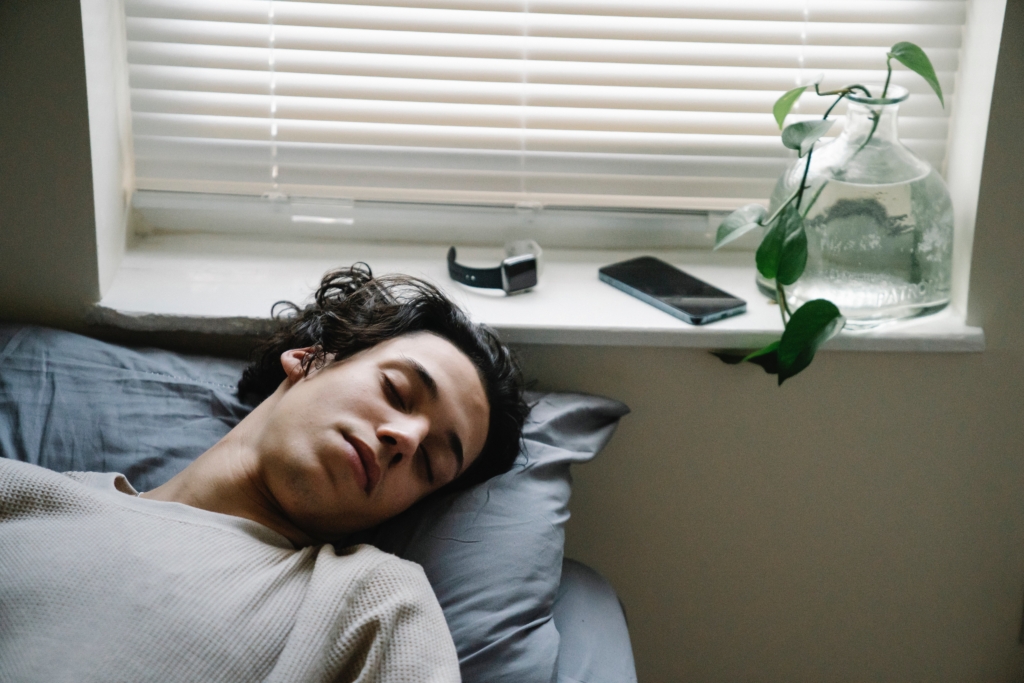
Smartphone addiction is real. If you have a habit of sleeping with your phone within arms reach it may be hard to put it down and get some shut eye.
Research has shown a positive correlation between smartphone addiction and poor sleep.
By placing your phone out of reach, it is less likely you will get up to fetch it and scroll the night away. 28
29. Switch Your Mattress for a Medium-Firm Model
Research has shown that a medium-firm mattress promotes increased sleep quality.
Since we spend one third of our lives asleep (according to the NIH), a newer mattress is well worth the investment.29
30. Add Lions Mane and Reishi Mushrooms to Your Supplement Regimen
It has been shown that Reishi mushroom, when used long-term, can increase the state of deep sleep and can help regulate the sleep-wake cycle.30
Additionally, subjects in one study took Lion’s Mane Mushroom for one month and reported increased sleep quality. 31
31. Avoid Going to Bed Hungry
Hunger pangs and appetite- stimulating factors can reduce the feelings of sleepiness and stimulate wakefulness.
If you find you are tossing and turning, a light snack might help quiet those sensations and help you get some shut eye.32
32. Try Some Chamomile Tea Before Bed
Chamomile has been shown to have sedative properties that have been likened to a benzodiazepine effect.33
33. Swap Your Chocolate for Carob
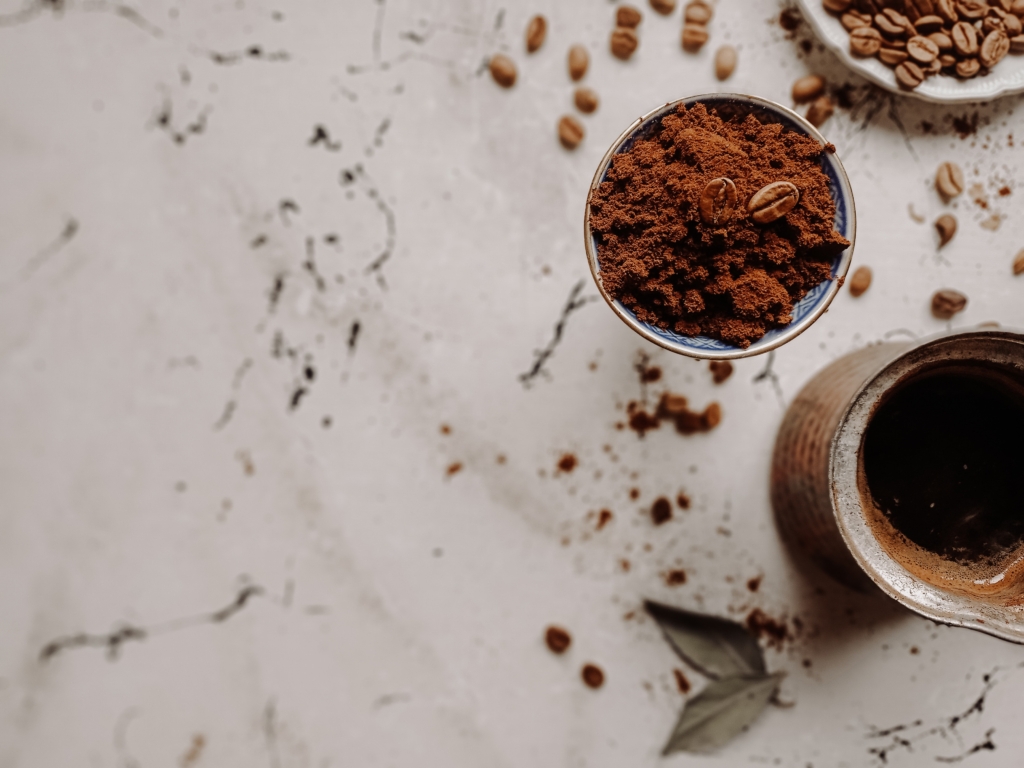
Cocoa powder in chocolate can contain varying amounts of caffeine, which is well known to disrupt sleep.
Carob is a chocolatey replacement that not only is caffeine free, but contains different vitamins and minerals that may be a benefit for sleep.34
34. Reduce Your Salt Intake, Particularly at Dinner
A high salt diet has been shown to disrupt circadian rhythm in animal models and has been shown to increase sleep apnea episodes.35, 36
Therefore, reducing salt intake is likely to have a positive impact on sleep quality and duration. Put down that shaker!
35. Reduce Caffeine Consumption, Especially if You are Near Your Period
Reducing caffeine consumption to promote sleep is a no brainer, but did you know that the rate of metabolism can change depending on where you are in your menstrual cycle?
Research suggests that caffeine metabolism may be slowed in the late luteal phase (leading up to the onset of menstruation).
So that mid-afternoon coffee may be affecting your sleep much later into the night. 37
36. Check Your Medicine for Side Effects
Certain medications can have negative impacts on sleep. These include statins, antidepressants, corticosteroids, and more.
Talk with your healthcare provider if you suspect your medication may be hindering your ability to sleep.38
37. Stretch Before Bed
Research has shown that the amount of REM (rapid eye movement) sleep and sleep quality increase after adopting a routine of light stretching in the evening.
Grab those yoga mats and give it a try!39
38. Consume Tryptophan-Rich Foods in the Evening
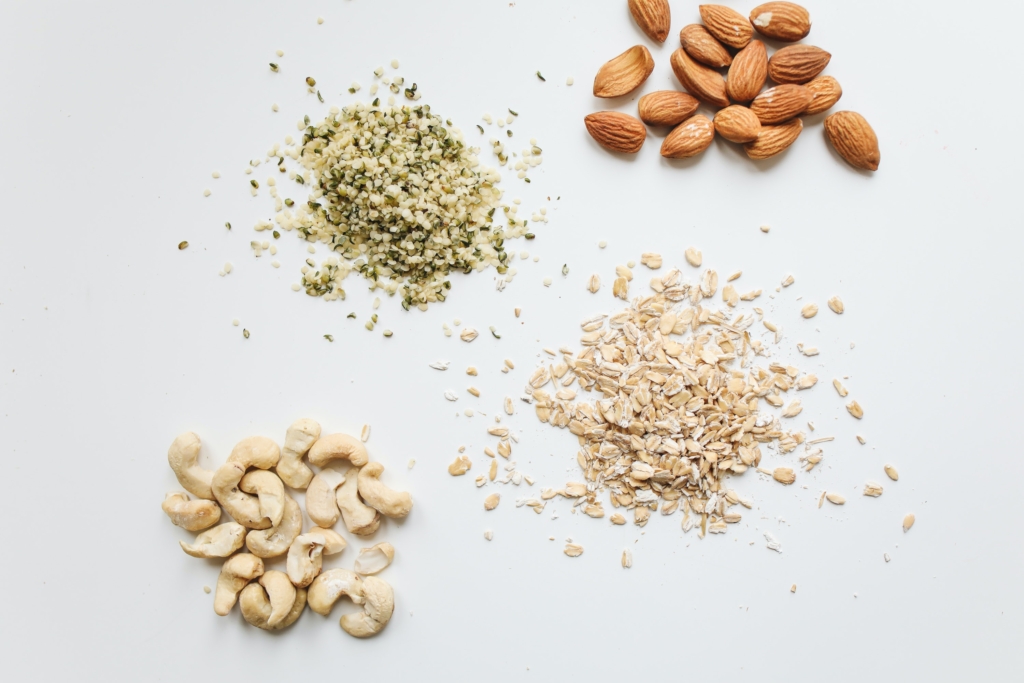
Foods such as milk, oats, nuts/seeds, and poultry are rich in tryptophan. Tryptophan acts as a precursor to melatonin and serotonin, both of which can reduce insomnia.40
39. Write Down Your To-Do List Before Bed
A study showed that participants were better able to fall asleep after writing down a specific to-do list for the next day.
The speed with which they fell asleep increased as they were more specific about the tasks they wrote down.41
40. Reduce Sugar and Saturated Fat, Increase Fiber
A diet rich in added sugars and saturated fat, while also being low in fiber have been shown to be associated with an increase in sleep disruption and overall sleep quality.42
41. Take an NAC Supplement
Although N-Acetylcysteine may seem like a mouthful, it has shown to decrease the time it takes to get to sleep when taken orally.43
42. Get and Air Purifier
Adding an air purifier and running it while sleeping has been shown to improve sleep quality.44
43. Get Adequate Sunlight During the Day

Sunlight has been shown to increase the body’s ability to produce its own melatonin.This is due to the infrared component of sunlight, which is also found in the light emitted by fire.45, 46
What Is Sleep Hygiene?
Sleep hygiene refers to your overall habits that affect the quality and quantity of your sleep. It is not just what you do at night that can improve sleep hygiene, it is also largely dependent upon your habits during the day. Sleep is largely dependent upon circadian rhythm, which in turn is linked to many different systems in the body and lifestyle factors.12 Achieving better sleep therefore is best achieved by creating and adhering to a system of lifestyle changes. Adopting only one or two of the steps above can help a little, but the more you add and adapt, the more benefit you will experience. Small changes compounded overtime is the name of the game, and we are in it to win it.
How Can Better Sleep Benefit You
As discussed in the intro, a lack of sleep can drastically impact many short-term and long-term aspects of life. According to the NIH47, a lack of sleep can dramatically increase your risk of various chronic diseases, such as cardiac disease, diabetes, depression , and obesity. A lack of sleep can also decrease cognitive function and increase decision making errors. This can lead to more accidents and mistakes. Adults and children who lack sleep may also show signs of attention-deficits, leading to a decrease in school or work performance.48 Improved sleep can also aid in faster healing, balanced hormones, and the ability to fight off illness.
Conclusion
Improving sleep is more than just popping some melatonin. There are many lifestyle changes you can easily incorporate into your day-to- day routine.
These changes do not have to be drastic, they can simply start with reducing exposure to blue light and drinking more water throughout the day.
This blogpost was written to inspire small and simple changes that compound overtime. Each of the suggestions have been backed by research published in scientific journals.
Frequently Asked Questions
- Q: Which sleep stage is most important? A: All stages of sleep serve a purpose and function and are all necessary for our wellbeing. That said, stage 3 (or deep sleep) is known to be the most restorative to the body. During this phase, the body is able to repair tissue and your brain is able to process memories.49
- Q: What if I work the night shift? A: Although working the night shift is not ideal, there are still many small changes you can make to improve sleep. This includes maintaining a strict sleep schedule, avoiding artificial light before bed, exercising, and going right to bed after your shift have all been shown to aid in proper sleep.50
- Q: Should I use a sleep tracker? A: Research has shown that certain commercially available sleep trackers have been shown to perform rather well in detecting low levels of activity (and therefore time asleep). They were, however, not as accurate in detecting different stages of sleep. Thus, it may be beneficial to track time asleep versus time awake. 51
References
- https://www.ncbi.nlm.nih.gov/pmc/articles/PMC3265077/
- https://www.ncbi.nlm.nih.gov/pmc/articles/PMC3703169/
- https://www.ncbi.nlm.nih.gov/pmc/articles/PMC6751071/
- https://www.ncbi.nlm.nih.gov/pmc/articles/PMC5713303/
- https://www.wellandgood.com/waking-up-same-time-every-morning/
- https://www.webmd.com/a-to-z-guides/ss/slideshow-sunlight-health-effects
- https://www.ncbi.nlm.nih.gov/pmc/articles/PMC3427038/
- https://www.hopkinsmedicine.org/health/wellness-and-prevention/exercising-for-better-sleep
- https://trialsjournal.biomedcentral.com/articles/10.1186/s13063-021-05831-3
- https://www.ncbi.nlm.nih.gov/pmc/articles/PMC3499892/
- https://academic.oup.com/sleep/article/46/3/zsac305/6912219
- https://nigms.nih.gov/education/fact-sheets/Pages/circadian-rhythms.aspx
- https://academic.oup.com/sleep/article/42/2/zsy210/5155420
- https://www.ncbi.nlm.nih.gov/pmc/articles/PMC4425165/
- https://www.ncbi.nlm.nih.gov/pmc/articles/PMC4666864/
- https://news.mit.edu/2001/melatonin-1017
- https://pubmed.ncbi.nlm.nih.gov/20347389/
- https://www.ncbi.nlm.nih.gov/pmc/articles/PMC9014247/#:~:text=In%20summary%2C%20L%2Dtheanine%20shows,physical%20fitness%20to%20some%20extent.
- https://www.ncbi.nlm.nih.gov/search/research-news/3495/#:~:text=Research%20suggests%20a%20warm%20bath,that’s%20a%20circadian%20sleep%20signal.
- https://pubmed.ncbi.nlm.nih.gov/34049045/
- https://jcsm.aasm.org/doi/10.5664/jcsm.8636
- https://www.ncbi.nlm.nih.gov/pmc/articles/PMC3328957/#:~:text=Recently%2C%20we%20found%20that%20a,in%20sleep%2Drestricted%20healthy%20subjects.
- https://health.clevelandclinic.org/how-often-should-you-wash-your-bed-sheets/
- https://www.psychologytoday.com/us/blog/engaging/202003/how-use-your-bed
- https://www.mayoclinic.org/healthy-lifestyle/adult-health/in-depth/napping/art-20048319#:~:text=Short%20naps%20generally%20don’t,might%20interfere%20with%20nighttime%20sleep.
- https://www.ncbi.nlm.nih.gov/pmc/articles/PMC9498537/#:~:text=Conclusions%3A%20Mouth%2Dtaping%20during%20sleep,was%20shown%20after%20mouth%2Dtaping.
- https://www.ncbi.nlm.nih.gov/pmc/articles/PMC4505755/
- https://www.frontiersin.org/articles/10.3389/fpsyt.2021.629407/full
- https://www.sciencedirect.com/science/article/abs/pii/S2352721815001400
- https://pubmed.ncbi.nlm.nih.gov/3255119/
- https://www.researchgate.net/publication/276152143_The_effects_of_Hericium_erinaceus_AmylobanR_3399_on_sleep_quality_and_subjective_well-being_among_female_undergraduate_students_A_pilot_study
- https://www.sciencedirect.com/science/article/pii/S0960982218313563
- https://www.ncbi.nlm.nih.gov/pmc/articles/PMC5470311/
- https://www.webmd.com/vitamins/ai/ingredientmono-321/carob#:~:text=Carob%20contains%20chemicals%20and%20fiber,levels%2C%20and%20lower%20cholesterol%20levels.
- https://www.ncbi.nlm.nih.gov/pmc/articles/PMC6895215/
- https://respiratory-research.biomedcentral.com/articles/10.1186/s12931-022-02300-6
- https://link.springer.com/article/10.1007/bf02285099
- https://www.webmd.com/sleep-disorders/medications-that-affect-sleep
- https://www.researchgate.net/publication/286575353_Effect_of_low-intensity_stretching_exercises_on_sleep_and_stress_in_people_with_mild_sleep_disorders
- https://pubmed.ncbi.nlm.nih.gov/23388477/
- https://www.ncbi.nlm.nih.gov/pmc/articles/PMC5758411/
- https://www.ncbi.nlm.nih.gov/pmc/articles/PMC4702189/
- https://www.mdpi.com/2076-3921/12/5/1124#:~:text=NAC%20treatment%20reduced%20latency%20to,post%20hoc%3A%20Fisher’s%20LSD).
- https://academic.oup.com/sleep/article/44/Supplement_2/A105/6260580
- https://www.melatonin-research.net/index.php/MR/article/view/19
- https://www.grassrootshealth.net/blog/melatonin-production-affected-sunlight/
- https://www.nhlbi.nih.gov/health/sleep-deprivation#:~:text=Sleep%20deficiency%20is%20linked%20to,adults%2C%20teens%2C%20and%20children.
- https://www.nhlbi.nih.gov/health/sleep-deprivation/health-effects
- https://www.hackensackmeridianhealth.org/en/healthu/2023/02/08/which-sleep-stage-is-most-important#:~:text=%E2%80%9CWhile%20all%20the%20stages%20of,Ghacibeh.
- https://health.clevelandclinic.org/how-you-can-sleep-better-if-you-work-the-night-shift/
- https://academic.oup.com/sleep/article/44/5/zsaa291/6055610

